A Meeting with Malcolm Adams, Part One:
For Malcolm Adams, the flight from Mobile, Alabama back to Washington, D.C. had seemed almost as long as his earlier flight from London Heathrow to the States. By now, he hoped, the replacement diesel generator would be fitted out below deck and his freshly painted yacht would be on its way from Mobile Bay to a dock he maintained near Houma, Louisiana, not far south of New Orleans. He found himself anxious about the captain he had hired—competent enough, surely, but he would have preferred to have sailed with Red Dawn. There was a lesson in the naming of his yacht: red sky at night, sailor’s delight; red sky at dawn, sailors be warned. The lady had certainly served him well through troubled passages of many different kinds.
“Please be seated, Mr. Adams.”
The man recognized this as an order framed as a polite request. The small, or perhaps compact, woman studied him from across the teacher’s desk. They were meeting in an empty classroom at a private school in Georgetown. She was cool, but not unfriendly; perhaps reserved would be the correct description that came to his mind. She was Madge Gonzaga, an assistant to President Carter, and he was meeting with her so that certain information could be exchanged privately at the President’s request. The man understood this. He took the oak chair without arms that occupied the space between the desk and the first row of small student desks. He had observed that the miniature desks were bolted to the floor in the old fashioned way of miniature wooden benches and scarred table tops, each slanting top bored with a hole for an inkwell that in recent years had evolved into a holder for ball point pens and pencils. Adams recalled that inkwells were still used back in the U.K.. A classroom clock on the wall behind Gonzaga clicked past four thirty. The red dot on its face indicated that the power had been off, recently, and that the system hadn’t been reset. He resisted the impulse to check the chronometer on his wrist.
Sunlight, cooled from a long passage through a brisk September afternoon, fell in orange pools across polished oak floors, across the desk separating him from the woman, and was absorbed into the folds of a United States flag hanging next to the door to the inside hallway. These old school designs were more secure than the modern “campus” models that had students entering and leaving by outside doors that could never be properly monitored. Adams could see the shadow of a security guard motionless on the other side of the frosted glass. His chair scraped across the floor as he pulled it under him nearer the edge of the desk. The woman settled into the padded, rounded office chair and rolled herself closer so that everything below her waist was hidden. She pressed forward with her elbows braced; her small breasts barely touching the wood surface, and let her hands hover over a folder spread out in front of her.
The fact that Miss Gonzaga was considered by many to be a mere social secretary who was out of the Washington policy loop is convenient, he reflected. And his identity as a British businessman with a vague diplomatic status provided by credentials supplied by the British Embassy was also helpful. Their meeting simply reflected an effort at coordinating an upcoming cultural event that the President planned to attend. Something else came to mind as Malcolm faced this woman. Gonzaga’s position as the President’s lightening rod for the women’s Equal Rights Amendment and other social issues made her a safe liaison where misdirection was required.
To be Continued
This is a work of fiction. All references to real names and places are accidental or are used for fictional purposes only.












December 19, 2014
Concrete Evidence, Feature